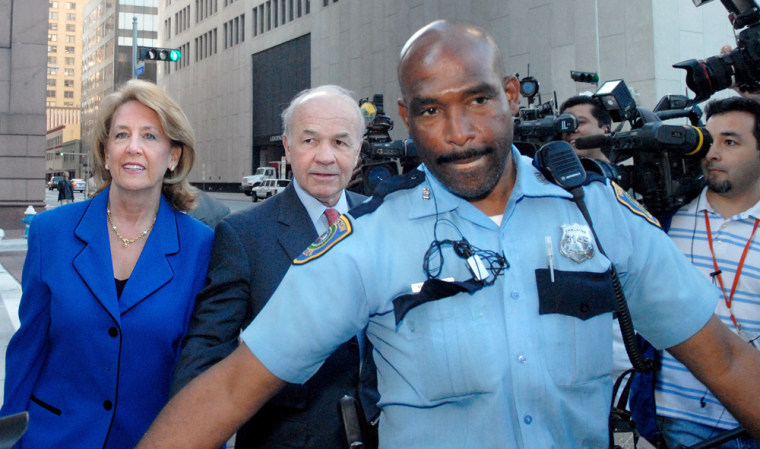At times Tuesday, it almost seemed easy to forget who was on trial — the one-time corporate chieftains Kenneth Lay and Jeffrey Skilling or the federal government’s own Enron Task Force.
As lawyers for Lay and Skilling laid out their closing arguments in the former Enron Corp. chief executives’ fraud trial, they shifted the focus squarely to prosecutors, painting them as bent on convicting the pair when they did nothing wrong.
In the day’s waning minutes in court, one of Lay’s lawyers even motioned to John Hueston, a task force prosecutor normally based in Los Angeles, and boomed: “Don’t come to Houston, Texas, and lie to us.”
The remark drew brief applause from Skilling and from members of Lay’s family watching in the courtroom.
Skewering the Enron Task Force was the theme of the day in six hours of defense arguments. Skilling lawyer Daniel Petrocelli suggested prosecutors had described Enron executives as “lieutenants” to raise a comparison between Enron and the Mafia.
As for the case against Skilling and Lay, Petrocelli said: “This was all manufactured after the fact. Because it’s Enron. After all, somebody has to pay. It’s Enron.”
Petrocelli portrayed the prosecutors as puppet masters, accusing them of seeking to win convictions by criminalizing innocent comments, honest mistakes and normal business practices.
“They had their eye on the prize. The prize was Jeff Skilling and Ken Lay, and that’s why we’re here,” Petrocelli said. “Documents don’t lie. People do. So you create evidence.”
The defense has contended all along that it was not a massive fraud that sank Enron in 2001 — rather that it was a lethal mix of negative press, lesser crimes by Enron Chief Financial Officer Andrew Fastow, short-sellers and the post-Sept. 11 bear market.
Prosecutors say Lay, the Enron founder, and Skilling, who served as CEO for six months in 2001, lied to investors and employees by touting Enron’s financial health when they knew accounting trickery hid failing ventures.
The government will have about two hours Wednesday morning to make their final argument to the eight-woman, four-man jury, and then jurors will begin deliberations. Lay and Skilling could face decades in prison if they are convicted.
Defense lawyers appeared to be pinning their hopes on Tuesday on shattering the credibility of the eight former Enron executives who pleaded guilty and testified for the government against Lay and Skilling — or at least raising doubt in jurors’ minds.
Petrocelli said the former executives were “robbed of their free will” by the task force, and pleaded guilty to crimes they did not commit out of fear of lengthy prison terms and expensive legal battles.
Lay lawyer George Secrest sounded the same theme, calling the government cooperators “radioactive” and insisting they could not be relied on for the “unvarnished truth.”
“These witnesses were not unvarnished,” Secrest said. “They were shellacked. They were groomed. Wind ’em up and point them in the right direction.”
Skilling faces 28 counts of fraud, conspiracy, insider trading and lying to auditors related to his activities from 1999 to August 2001. Lay faces six counts of fraud and conspiracy stemming mostly from the period after he resumed as CEO in August 2001.
On Thursday, which would be the Lay-Skilling jury’s second day of deliberations, Lay will go on trial again — before U.S. District Judge Sim Lake but without a jury — in a case related to his personal banking.
In that case, the government contends he obtained $75 million in loans from three banks from 1999 through 2001 and reneged on agreements not to use the money to carry or buy margin stock.
He is charged with one count of bank fraud and three counts of making false statements to banks in the case. Lake plans to issue his verdict in the banking case, which is expected to last several days, after jurors in the conspiracy case give theirs.
In the conspiracy case, which began in late January and saw its last full day in the courtroom on Tuesday, some of the highest drama came in the final half-hour.
Chip Lewis, the third of four lawyers for Lay to speak to the jury, told the panel he was “angry” at misrepresentations made by the task force, which is made up mostly of by lawyers from outside Texas.
He then gestured to prosecutor Hueston and railed, “Don’t come to Houston, Texas, and lie to us.”
Lewis was followed by lawyer Michael Ramsey, the head of Lay’s legal team, who was addressing the jury for the first time since his return from a trial absence for surgery.
In a speech that almost sounded fit for patriotic background music, Ramsey said it was the judge and the American flag — not the prosecutors — that represented the United States.
“You speak for the country when you render a verdict, and render a true verdict,” he said. “Not guilty. Not guilty. Not guilty.”
